Political settlement meeting ends with optimism, but no tangible deal

A meeting late Monday by Iraq’s leading political powers to discuss a controversial proposal for national political accord ended with a pronounced understanding, albeit with no tangible agreement.

Ammar al-Hakim, head of the Shia-led National Iraqi Alliance, which spearheads the proposed settlement, met Monday evening with Salim al-Jubouri, Iraqi parliament speaker and a senior leader of the Alliance of Iraqi Forces, the biggest Sunni bloc in the chamber which has voiced opposition to the document.
The meeting, which was held in Jubouri’s residence, discussed the situation after the anticipated defeat of Islamic State militants in Iraq, and attendants reached “a great understanding” on the proposal, al-Hakim said in statements following the meeting.
“We discussed all problems and took regional and international changes into consideration,” al-Hakim said, praising what he described as “genuine intentions” to “apply practical measures that will produce the political settlement”. He said he was confident in success by participation of Iraqis from all stripes, including Iraqi Kurdistan.
Al-Hakim added that joint panels would be formed to discuss the settlement in detail.
The Sunni alliance has yet, however, to officially pronounce its position regarding the project.
Al-Hakim, who heads the Islamic Supreme Council of Iraq, championed months ago a project for national reconciliation among various Iraqi political powers and social sects with the aim of promoting peaceful co-existence after the elimination of Islamic State militants from the country. His settlement involves promoting the rule of law, abandoning violence and the fair distribution of wealth. It excludes personalities linked to IS or the regime of late president Saddam Hussein.
But his draft has been met with reluctance from Sunni blocs led by the Alliance of Iraqi Forces and even from some Shia powers, most notably the State of the Law bloc, led by vice president and former PM Nouri al-Maliki.
Sunni opposition to the settlement draft became more vocal when the Shia-dominated parliament approved in November a law legalizing the status of the Shia-led, Iran-backed al-Hashd al-Shaabi popular militias which fight Islamic State militants on the Iraqi government’s side. Sunni powers had slammed the enactment of the law, saying it gives unchecked powers to the militias and fails to ensure rights and credit to Sunni fighters taking part in battles. The development prompted Sunni powers to voice their rejection of the settlement proposal before the United Nations officials who backed it.
